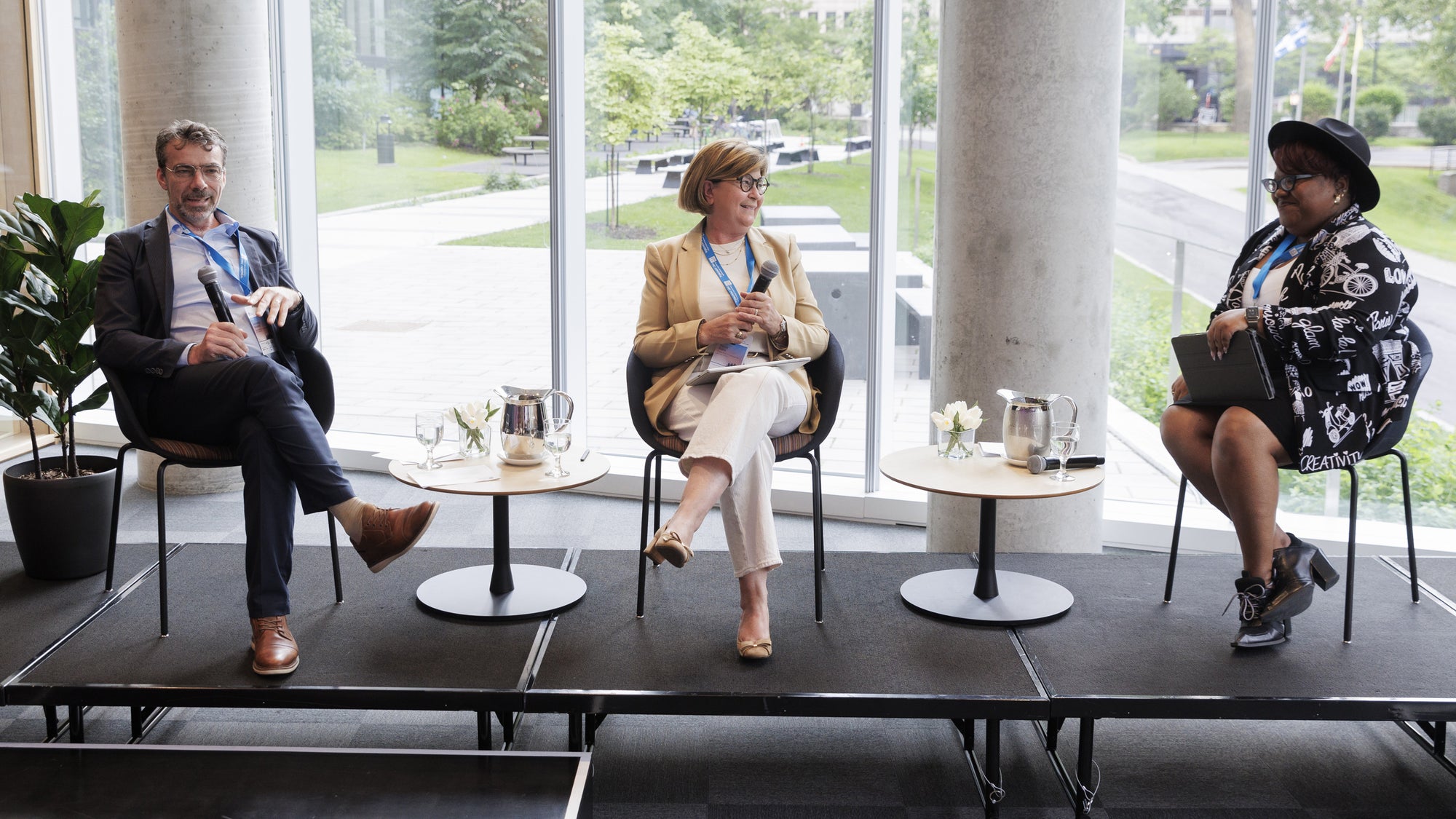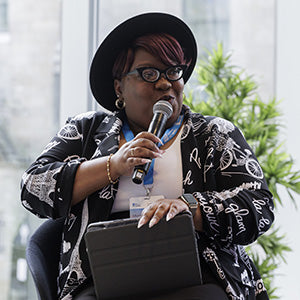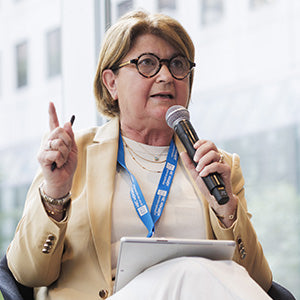Governance and EDI: A Hot-Button Topic

July 9, 2025
Although some organizations are resolute in their belief that equity, diversity and inclusion (EDI) play an essential role in attracting talent, creating a workplace that reflects the world we live in and boosting employee performance, others have questions about the importance and actual impact of these principles. Debates about EDI are currently raging, not just in the U.S., but also here at home.
EDI practices are being scrutinized in many spheres, according to HEC Montréal professor Sébastien Arcand, joint holder of a Research Chair in the Demolinguistic Situation and Language Policies in Quebec and Associate Director of the HEC Montréal Sports Hub. “Against this backdrop, how can businesses move forward while bearing EDI matters in mind and adjusting some of their practices?”
This served as the jumping-off point for the discussions held at a networking cocktail reception hosted by Executive Education HEC Montréal on June 12. The title of the event was “A Nuanced Look at Ethics and EDI in an Increasingly Polarized World.” Professor Arcand moderated this discussion between:
- Murielle Chatelier, President, Association des Québécois unis contre le racialisme (AQUR)
- Tania Saba, PhD, CHRP (Fellow), the founder and holder of the BMO Chair in Diversity and Governance, and a full professor with the School of Industrial Relations at the Université de Montréal.
Unexpected outcomes

Murielle Chatelier explained that EDI policies, or rather the means used to implement them, do not always achieve what they were designed to do. She touched on affirmative action in U.S. universities, which was ended in 2023 with what she qualified as a “historic” ruling by the country’s Supreme Court. She pointed out that many Asian and African American students belonging to the group Students for Fair Admissions had been calling for an end to racial criteria to university admissions. “They feel, and I agree with them, that true equality is rooted in merit, not on racial quotas.”
She also brought up the equity targets that Canada Research Chairs has set for 2029, i.e., 22% racialized individuals, 4.9% Indigenous Peoples, 7.5% persons with disabilities and 50.9% women. “The problem is that we’re imposing these targets on researchers and threatening to withhold grant funding if they don’t meet them,” she said.
She also criticized the fact that some job postings discriminate against white candidates, as has been claimed in numerous complaints filed with the Canadian Human Rights Commission. “Can we really fix discrimination against one group by discriminating against another?” she asked.
Chatelier also called out certain EDI training programs that explain complex issues in overly simplistic terms, and pigeonhole people as victims and oppressors. Broad generalizations like these don’t build bridges, she said. They tend to exacerbate existing tensions. “Multiple studies have shown that training programs like these do nothing to combat prejudice. They don’t get people to collaborate more effectively, they don’t help retain any employees, let alone employees from minority backgrounds, and they fail to ease conflicts in the workplace,” she asserted.
Reframing not retreating

Tania Saba said that EDI policies can indeed lead to certain missteps, but she stressed it was vital to draw a distinction between the underlying principles and the means used to arrive at stated aims. Addressing underrepresentation is one thing, she said, but “what we often forget when we’re talking about EDI is that the goal is to make all practices and decisions in our organizations equitable.”
She likened EDI to a pair of glasses that organizations use to scrutinize systems in order to determine whether they are fair or biased. Without this kind of analysis, the practices that are put in place may be inconsistent and ineffective.
Saba also emphasized that discriminatory policies like mandatory quotas are not allowed in Canada. Instead, there are targets in place that still take individual qualifications into account. She said it was important to look at EDI practices critically, but it would be unfair to dismiss the fundamental principles underpinning them out of hand.
Toward a more inclusive approach to governance
According to Saba, there are plenty of valid arguments in favour of making governance more inclusive, at both the board and the senior management level. A decision-making body that is too homogenous lacks the range of perspectives required to ask thought-provoking questions. Countless corporate financial and sex scandals, from Enron on down, are ample proof of the inherent harm of echo chambers. Saba added that a number of studies demonstrate that diversity when combined with inclusive government mechanisms can have a decisive impact on economic performance, innovation and sustainability.
She also said that organizations stand to gain from including women-owned businesses in their value chain, especially in forward-looking fields like femtech (tech-enabled solutions for women’s health) and greentech. And having a multicultural team can be a significant asset when it comes to breaking into new markets — a plus that can’t be overlooked in this age of U.S.-spurred trade wars.
Despite these benefits, however, it remains necessary to push the needle to increase the representation of underrepresented groups in leadership teams. “The problem is that time alone doesn’t change anything,” Saba stated. Case in point: in 2024, even though 77% of the boards of publicly traded Canadian companies had at least one woman, a mere 29.8% of board seats were held by female directors. And in the C-suite, only 21% of C-suite positions were occupied by female executives — and this was actually down from 2022. The statistics are even grimmer for Indigenous people, racialized groups and people living with disabilities.
Representation isn’t just a matter of fairness, continued Saba. It’s a standard of governance that falls within the realm of ESG (environmental, social and governance) criteria. Where there is a lack of diversity, there may be more obstacles to certain types of funding or ethical investment funds. Introducing by-laws, standards and initiatives can often address this issue.
Beyond labels
Although she believes in the principles of EDI, Chatelier is an advocate for moving beyond labels based on race, gender or other characteristics. “In a fair society, everybody would be judged on their performance and their output. Their personal dignity would mean more than any social construct. We have to shift the focus away from identity-centred approaches so we can achieve a true, human-centred form of social justice.”
Lumping together all forms of underrepresentation, be it ethnic or gender-based, and calling it discrimination is oversimplifying things, said Chatelier. It’s important to go deeper and understand the root causes of these disparities — and establish specific targets on an industry-by-industry basis, rather than making sweeping generalizations based purely on demographics. Chatelier admitted that EDI policies don’t take into account certain realities, including socioeconomic conditions. People at the top of the social ladder benefit as a result. “The purpose of fighting injustice should be to give everyone an equal chance, no matter where they come from or what their social status us. The idea is to promote equal opportunity, not equal results.”

Several members of the audience contributed to the discussion. “We often hear tell of the value of safe spaces, where people feel comfortable expressing themselves, but having brave spaces, where they can ask questions and share their experiences is essential to progress. Giving us this opportunity today was indeed brave,” said Arcand in his closing remarks. Conversations like these can be difficult, but they are incredibly significant.
This event was made possible through the support of the founding member and partners of the Certification in Ethics and Compliance at Executive Education HEC Montréal, namely La Caisse, the Commission de la construction du Québec, Desjardins and KPMG, in collaboration with the BMO Chair in Diversity and Governance and the Université de Montréal’s Facultory of Law.

Learn more about our Certification in Ethics and Compliance.
